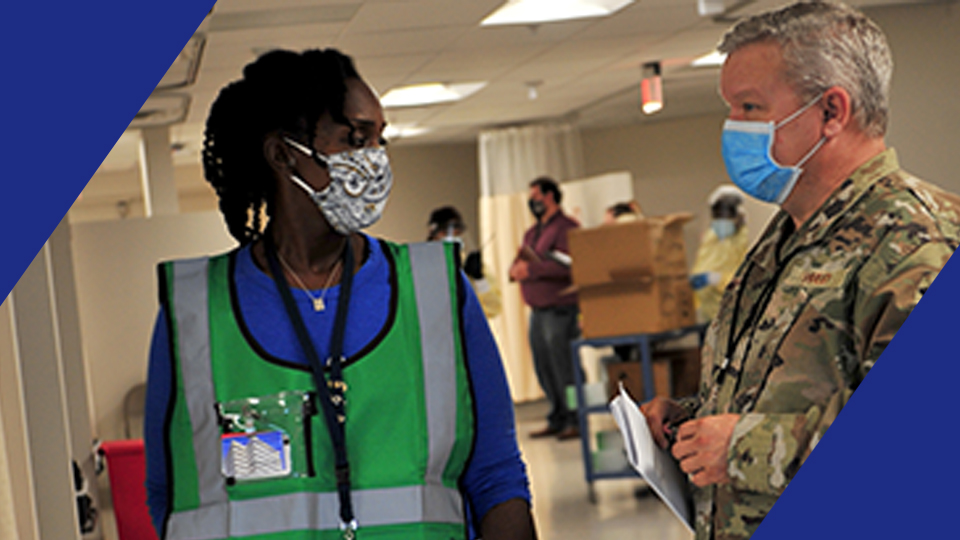At a glance
The mission of CDC's Preparedness Field Assignee (PFA) program is to build and support state, tribal, local, and territorial (STLT) capacity by providing exceptional field services to prepare for & respond to public health emergencies and natural disasters. To achieve this mission, the program places PFAs in Public Health Emergency Preparedness (PHEP) recipient jurisdictions around the country to serve as embedded field staff.

CDC's Preparedness Field Assignees
CDC Preparedness Field Assignees (PFAs) become embedded staff, assisting jurisdictions with public health preparedness planning and response efforts using the framework of the 15 Public Health Emergency Preparedness and Response Capabilities. Since the program's inception in 2012, 93 field assignees have served in 40 states, four large metropolitan areas, and one U.S. territory.
About the Preparedness Field Assignee (PFA) Program
The Preparedness Field Assignee (PFA) Program is managed by CDC's Office of Readiness and Response, Division of State and Local Readiness, Field Assignee Services Branch. It provides new graduates of CDC's Public Health Associate Program (PHAP) an opportunity to continue to strengthen skill sets acquired during their initial training. The PFA program recruits highly skilled PHAP graduates for placement in state, local, or territorial health departments to support public health preparedness and response activities.
Selected PFAs are matched with approved host sites. In partnership with PFA program leadership, these sites offer experience and mentorship that supports the continued development of a knowledgeable, responsive, and effective public health workforce while strengthening and advancing the capabilities of state and local public health systems. During their assignments, PFAs can expect to work hand-in-hand with state and local partners, in an all-hazards approach to preparedness, as they grow and develop into public health leaders. Skills learned in the PHAP program are routinely applied with additional emphasis on building proficiencies in public health, program management and leadership, emergency preparedness and response, communications, and partnership development. In addition to cultivating early-career professionals equipped with the essential skills to advance their public health careers, sponsoring host sites gain a valuable resource that compliments, enhances, and expands their ability to meet priority preparedness and emergency response activities.
CDC PFAs become embedded staff, assisting jurisdictions with public health preparedness planning and response efforts using the framework of the 15 Public Health Emergency Preparedness and Response Capabilities.
Preparedness Field Assignee (PFA) Program Fact Sheet
Become A PFA
The PFA program recruits and hires directly from CDC's Public Health Associate Program (PHAP). The PFA recruitment process is structured to select the most qualified employees possible, based on merit, interest, and knowledge. Prior experience in preparedness is not required. Experience and foundational public health knowledge gained through PHAP have proven transferable to public health preparedness, allowing staff to readily assimilate and make positive contributions to their host agencies.
Eligibility Information
The Preparedness Field Assignee (PFA) program recruits and hires directly from CDC's Public Health Associate Program (PHAP). PHAP is a highly competitive two-year workforce development training program for early career public health professionals. As CDC assignees to local and state health departments, PHAP associates work alongside public health professionals where they gain valuable hands-on experience while increasing the capacity of their host-site agencies. PHAP associates spend two years working in a respective public health program area, as determined by the host agency. Program areas include, but are not limited to, public health preparedness, environmental health, immunizations, communicable disease, global migration and quarantine, chronic disease.
Graduating associates from the CDC Public Health Associate Program are eligible to apply to the PFA program.
The PFA program seeks candidates with an interest in public health emergency preparedness and response who demonstrate the capacity to be flexible, work well as part of a team, and are socially and culturally inclusive when working with others.
The PFA recruitment process is structured to select the most highly qualified employees possible, based on merit, interest, and knowledge. Specific experience in public health preparedness and response is not a prerequisite to applying. Experience gained through PHAP at a state, local and national level, coupled with a foundation of public health knowledge and transferable skills related to project management, data collection and analysis, and program evaluation, allow PFAs to readily assimilate and make positive contributions to their host agency.
Recruitment for the PFA program traditionally takes place annually between March and May.
PFA Application and Recruitment Process
The PFA program recruits and hires directly from CDC's Public Health Associate Program (PHAP). Graduating PHAP associates are eligible to apply to the PFA program. Recruitment for the PFA program traditionally takes place annually between March through May. Each year, the PFA program works with PHAP to put out a call for applications to the graduating associates. Candidates are traditionally asked to submit their applications in early April.
The PFA program reviews all submitted applications and selects a smaller pool of the most qualified applicants, who then compete in two rounds of interviews with PFA program leadership. The recruitment process is structured to select the most qualified employees possible, based on merit, interest, and qualifications. The PFA program makes a focused effort to match the skill sets of selected candidates with the proposed activities included in the PFA host agencies' letters of intent. Once the interviews have been completed, tentative offers are made to the selected candidates in late April, and CDC's human resource office makes official offers in May. Host agencies are notified of PFA selection in May to enable them to have adequate time to plan for the PFA's arrival in October.
